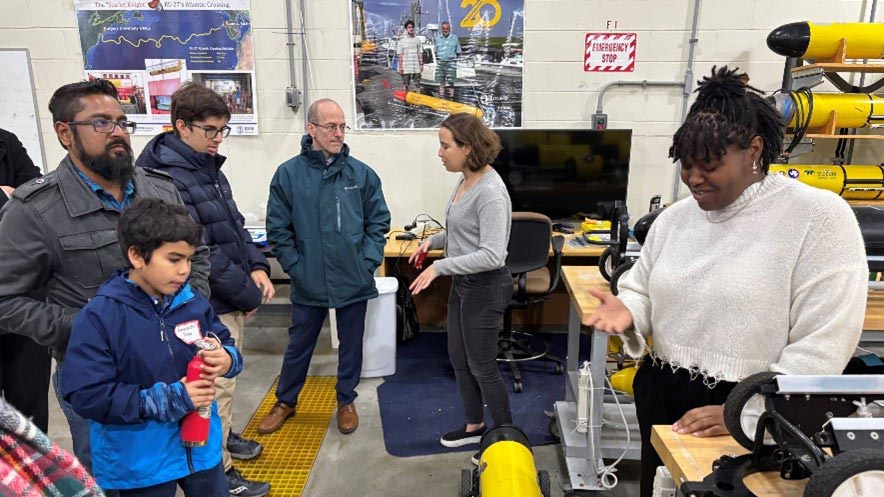- 848.932.7474
- info@rutgersalumni.org
A Rutgers Alumni Association (RAA) event celebrated the 15th anniversary of a Rutgers robotic glider’s landmark journey across the Atlantic Ocean, announced another mission, and focused on the critical importance of ocean research.

When Hurricane Beryl churned toward the Caribbean Sea last summer, Leah Hopson knew she had an exceptional opportunity.
The doctoral student in oceanography at Rutgers was assisting her lab mate, Joseph Gradone, a postdoctoral researcher, in remotely piloting a robotic glider to measure and record data from underneath the ocean’s surface. Her glider—one of 40 yellow, torpedo-shaped battery powered unmanned vehicles employed by the Rutgers University Center for Ocean Observing Leadership (RUCOOL)—was near the dangerous storm’s path.
Hopson and her peers and faculty mentors connected with the National Oceanic and Atmospheric Administration (NOAA) to send the glider deep beneath the surface of the hurricane to monitor the ocean’s temperature and other factors during the Category 5 hurricane.
“It got about 17 nautical miles from the center of the storm,” she said during a tour of RUCOOL facilities on the Cook Campus on December 4 at a Rutgers Alumni Association event celebrating ocean exploration with Rutgers Marine and Coastal Sciences students and faculty.
Hopson said data gathered from the glider deep below the ocean’s surface will be analyzed to learn more about storms and the ocean’s response. The study will be a key part of her dissertation.
She said she enjoyed the opportunity to connect with alumni attending the tour.
“I love when alumni come back to campus,” she said. “I love the opportunity to connect with them and collaborate.”
In addition to the tours, the evening included a discussion and film about the groundbreaking 2009 Atlantic crossing of the glider RU 27, as well as the announcement of the forthcoming Sentinel Mission, which soon will launch a robotic glider that will attempt to circumnavigate the globe.
Oscar Schofield, Distinguished Professor and chair of the Department of Marine and Coastal Sciences, said the landmark Sentinel Mission is tentatively scheduled to launch soon from Cape Cod, Massachusetts, with plans to ultimately land in Cape Town, South Africa.
Schofield said the alumni support of the missions has been instrumental in past success and will be in the future. “We are going to keep trying to build on that support,” Schofield said.
In attendance at the RAA event was Craig McLean, a 1979 Rutgers zoology graduate who went on to a 40-year career with NOAA before retiring as director of research in 2022.
“If it were not for Rutgers, I wouldn’t have the career I had,” McClean said, noting that a Rutgers professor connected with him NOAA research cruises when he was a student.
He also praised the importance of the work that the RUCOOL program and the significance of the alumni support it receives.
“This event keeps the alumni connected with what their university is doing and how their support translates directly into the opportunity for these young students,” McClean said. “Because this Glider program is so heavily supported by alumni contributions, it would not be what it is today were it not for the alumni. So to every alum who’s made the contribution or is thinking of making the contribution, I say ‘Thank you.’”
Donald Pray, a 1969 Rutgers College graduate, and his wife, Penny Pray, a 1970 Douglas College alumna, organized the RAA event which coincided with the 15th anniversary of the RU 27 glider successfully crossing the Atlantic Ocean in 2009. This was the first ever trans-Atlantic glider crossing and set a world record.
“This event is important because Rutgers is doing some amazing things in research,” Pray said. “We decided this year to support marine research, where we have one of the most outstanding glider programs in the world, after the U.S. Navy and NOAA, and more than any other university. This information is critically important because ocean temperature and salinity and other aspects of the ocean significantly influence our climate.”
Please consider making a gift to the RU COOL Excellence Fund.